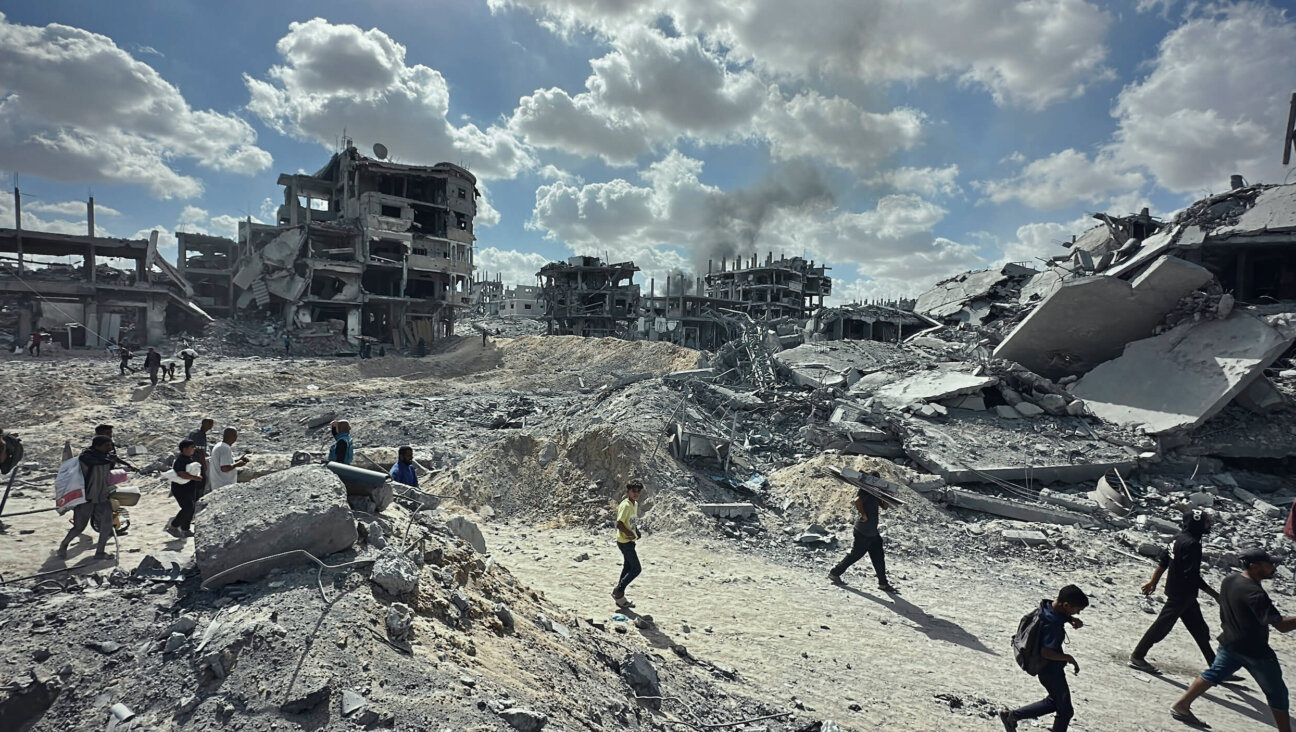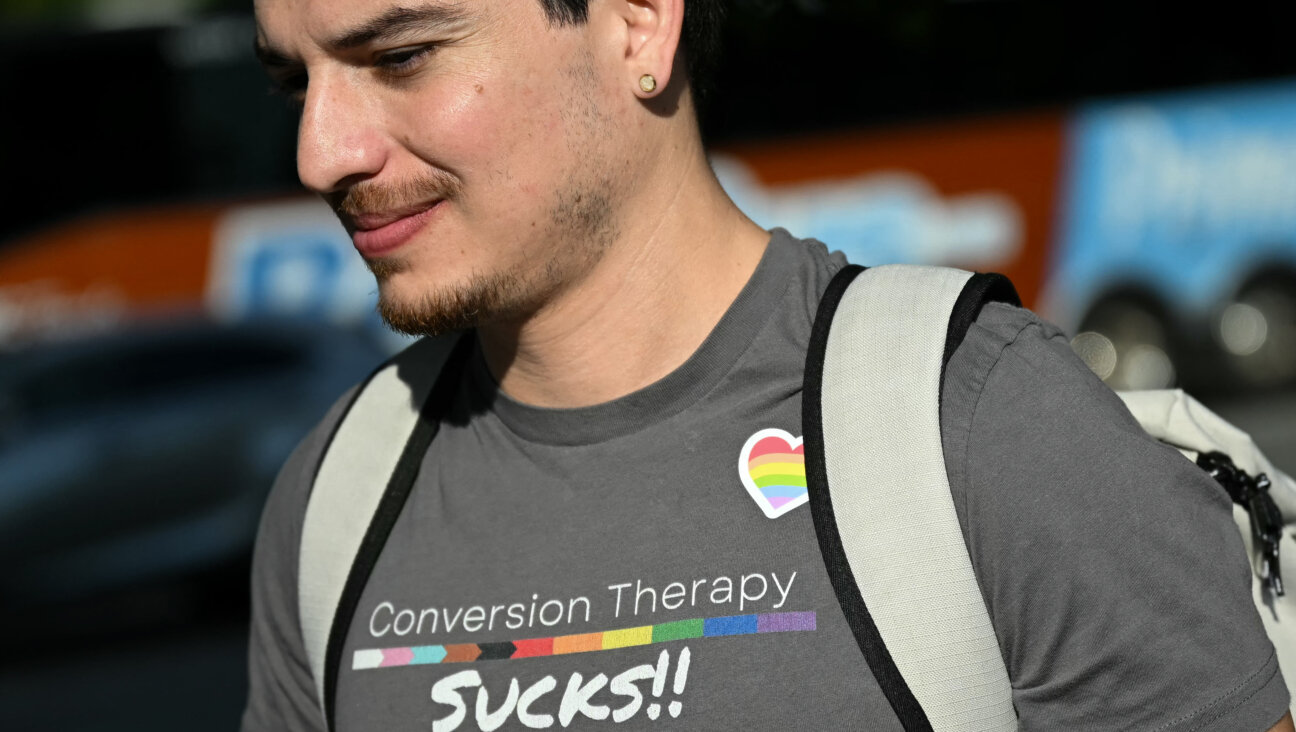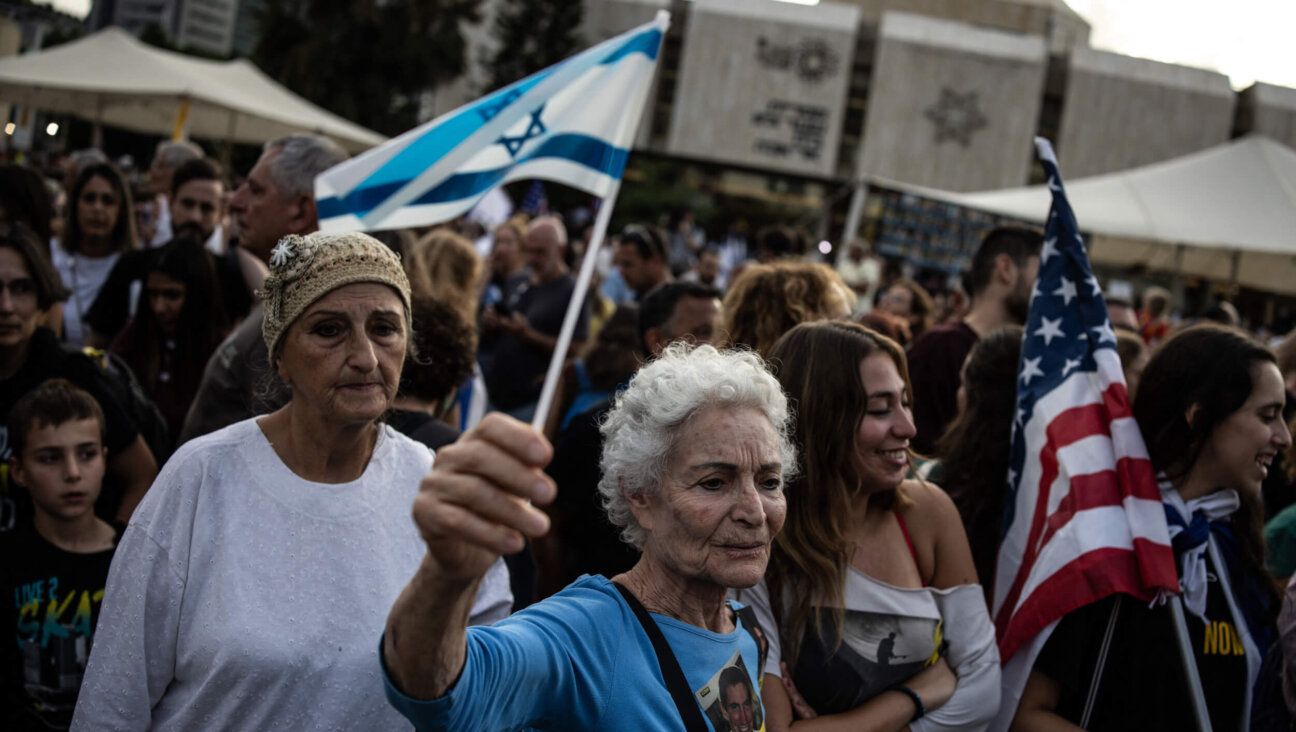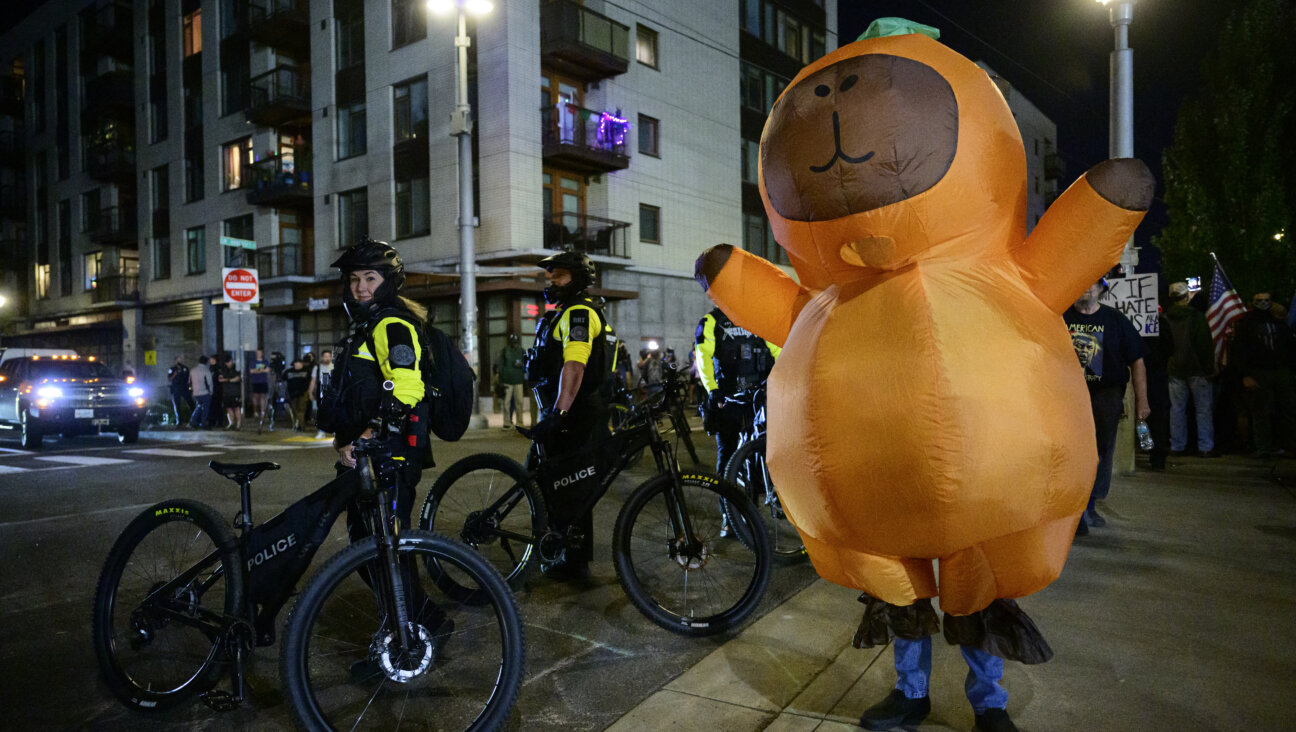I’m a former IDF combat soldier. Treating the trauma of Israelis and Palestinians is the only way forward
Without acknowledging our mutual pain while fostering trust and understanding, the fighting will never end
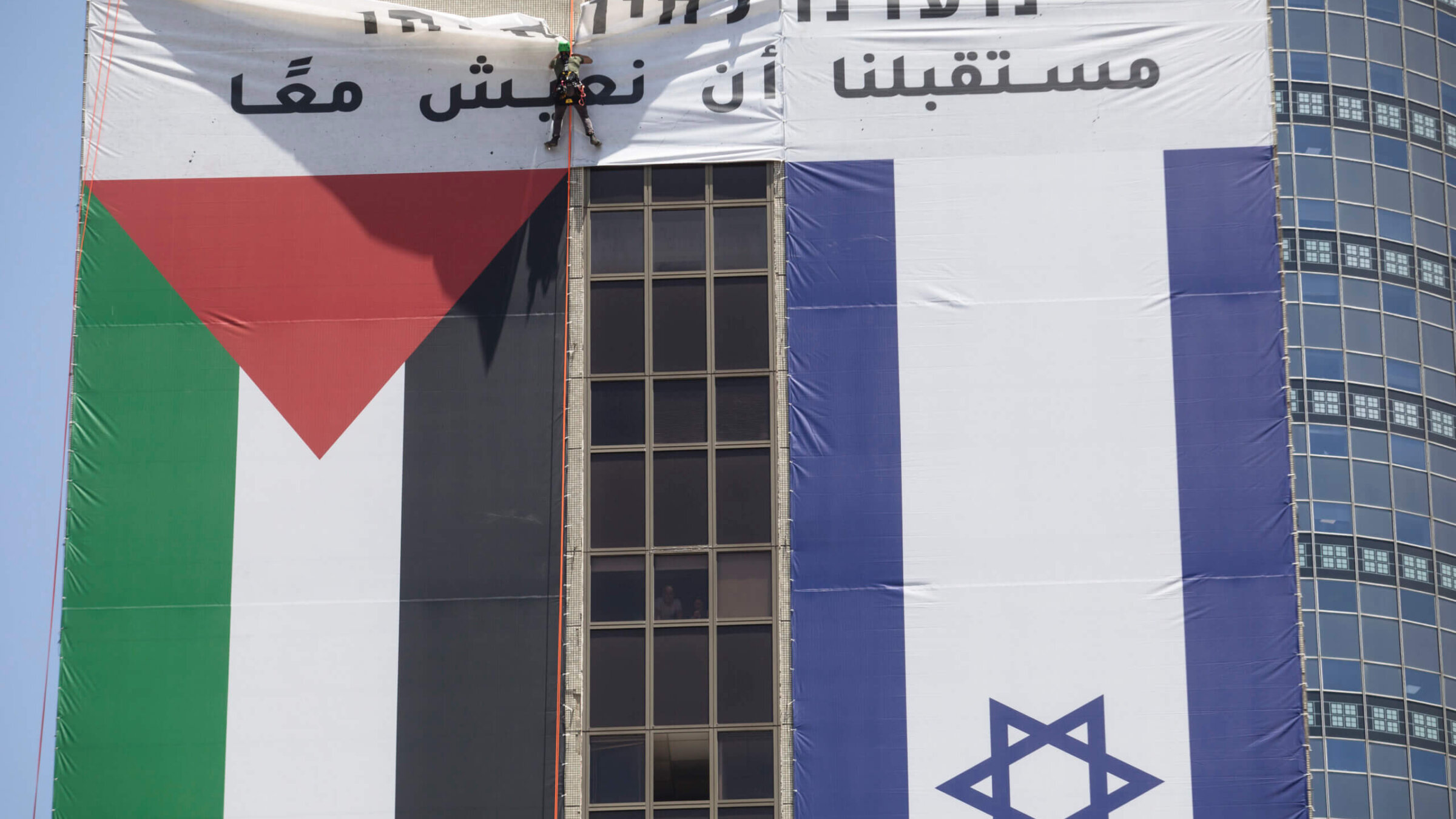
A man removes the Palestinian flag from a building after it was displayed by a left wing group in support of coexistence, June 1, 2022 in Ramat Gan, Israel. Photo by Amir Levy/Getty Images
Growing up in Jerusalem during the Second Intifada, you get used to asking yourselves questions no child should ever ask.
Will the bus I’m riding explode?
Was that the last goodbye to my parents, my friends?
Who could ever do this to us? Why?
When you hit 18, the life-or-death questions become ever more persistent: Where will I serve my mandatory military service? Will I be sent off to war? Give my life for my country?
There were some mantras all of us Israelis agreed upon: Palestinians understand only force. In this “tough neighborhood” of the Middle East, violence is necessary. The world will always turn a blind eye to the killing of us Jews. We must defend ourselves by ourselves, let the world say what it wants.
It took me years until I realized these mantras were born from trauma. It took me even longer — spending my army service in the West Bank, listening to peace activists and meeting my first Palestinians in university — to finally see that the Palestinians are our mirror image. We share histories of displacement, persecution, pain and a longing for our historic homeland.
Without acknowledging our mutual trauma and working toward healing it, the cycle of violence will never end.
Having studied in a religious Zionist yeshiva, I initially entered my army service as a true believer in Israel’s just cause and right to the land. This paradigm was gradually shattered, beginning with my time serving in the occupied West Bank.
In 2008, I participated in my first active operation as a combat soldier in the West Bank. I was excited and patriotic, proud to protect my country and land. I ended up inside a Palestinian home where I watched over a family, weapon drawn. Women and children cried while my friends arrested the father and rummaged through the house. I gazed into that family’s eyes and saw only fear, vulnerability and hatred. “Who will these children grow up to be?” I wondered. I thought of my childhood terror during the Second Intifada, the wounds that never heal. Will the violence ever end? Are our peoples doomed to communicate forever through force and distrust?
As my army service continued, I found myself flooded with a deep curiosity and empathy toward the ultimate “other.” At checkpoints and in Palestinian villages at the crack of dawn, ready to surveil and arrest, I couldn’t help but wonder how the Palestinians viewed us. I started questioning my moral justifications and ideology, and vowed to try and make sense of it all when I got discharged.
I began exploring groups working for peace between Israelis and Palestinians, and eventually became a member of Women Wage Peace — an Israeli-Palestinian nongovernmental organization whose 74-year-old co-founder, Vivian Silver, was murdered on Oct. 7. One day, a group of us listened to a talk by a Palestinian peace activist from Hebron, a place where I had previously served in my tour of duty.
Israel had one brave leader, Yitzhak Rabin, who was ready for painful peace, she said, yet you assassinated him and voted in his most vocal opponents. The Palestinian Authority, she continued, failed for years to negotiate a settlement with Netanyahu to return Palestinian prisoners and detainees. But then Hamas kidnapped one Israeli soldier, Gilad Shalit, and got 1,027 prisoners freed in exchange.
“Is it any surprise many Palestinians doubt Israel wants a peaceful solution?” she asked. “That they believe violence is the only language you understand? As peace activists we must, together, prove them wrong.”
I was as dismayed and shaken as when first experiencing a terrified Palestinian family in their home. For the first time in my life I could see from the Palestinian’s point of view. As Israelis the story is simple: We keep extending our hand for peace and getting violence in return. Yet the Palestinian activist’s comments made me wonder if perhaps it is the opposite that is true. Is it us, the Israelis, who are to blame for this everlasting war?
It wasn’t until I was a student at Tel Aviv University that I engaged in my first real political discussion with a Palestinian — a fellow law student. Gradually overcoming barriers of distrust and suspicion, we kindled a fragile friendship while arguing for hours about historical facts and moral truths. They had never learned about the Holocaust and our historical ties to this land. I had never seriously considered the Palestinian experience. Yet as I listened to them, concepts like Nakba and the occupation, Palestinian refugees and their right of return, all melded into a coherent narrative for me.
Our conversations left me more confused than before, swirling in a moral vertigo. Had we both been lied to all our lives? Can these parallel narratives ever meet? How could two nations be both so right and so wrong?
Distraught and confused, I then landed in therapy, where I learned to view myself, and the conflict, through a psychological lens. Israelis and Palestinians, individually and collectively, all have trauma in this troubled land. I learned that if this trauma continues to be ignored and untreated, we shall violently relive it, endlessly. Victimhood, self-righteousness and infinite blaming are this trauma’s symptoms, introspection and taking of real responsibility its cure. Anger, hopelessness and distrust can and must be unlearned.
This trauma is the bedrock of our national psyche and politics. When you believe you are fighting for your very survival — as both Israelis and Palestinians do — no force in the world will convince you otherwise, only prove you right. Violence shatters trust, leading to more violence. Extremism is always answered with counterextremism. Ruthless political slogans and policies only help reinforce both sides’ deepest existential fears. Denying each other’s lived experiences will merely keep us fighting for another hundred years.
From the river to the sea, 15 million people fear the “enemy” will throw them into the sea. Oct. 7 and its aftermath have now convinced both sides even further there is “no partner for peace.” Yet no one is going anywhere. Israelis and Palestinians desperately need safe spaces for fostering trust and understanding. Competing over whose suffering is worse, which narrative is truer or more just, only prolongs the war. We must instead process our collective and individual traumas together by acknowledging the other’s narrative and psyche.
This is not an excuse for shedding responsibility or normalization of atrocities committed by both sides, but a call for informed action with real policy implications. There is only one viable solution to the Israeli-Palestinian conflict: two sovereign states in one Holy Land. The difficulty lies in how to get there. The politics of trauma must make way for a politics of trust and hope.
